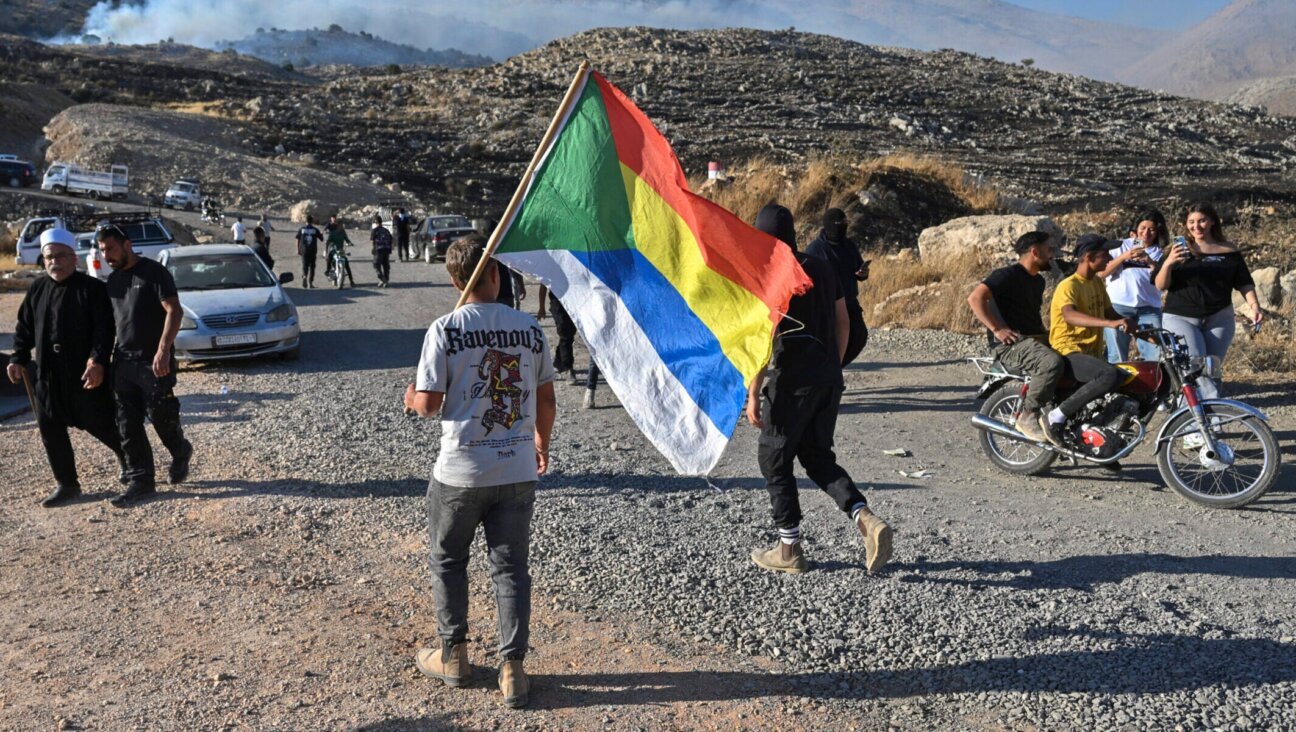He covered the Israeli-Palestinian conflict on campus. Then the protesters rebuked him.
Jacob Wheeler, a reporter at USC’s Annenberg Media, went on hiatus after attacks on his coverage turned personal

Jacob Wheeler outside of Kibbutz Kfar Aza, where dozens of Israeli civilians were killed by Hamas terrorists on Oct. 7.
Jacob Wheeler, a journalism student at University of Southern California, expected to take some flack for reporting on the Israel-Hamas war, but he never thought it would get so personal.
A pro-Palestinian march stopped in front of USC’s Annenberg School for Communications and Journalism last fall and a masked protester called Wheeler out by name into a megaphone, accusing him of pro-Israel bias. Wheeler, who is 21, said he stopped reporting for Annenberg after the Oct. 31 incident, both because he was disappointed in the school’s response and out of concerns for his safety.
“I was looking over my shoulder the next few days,” he said in an interview.
The fight for control of Israeli-Palestinian discourse raging across college campuses in the past year has put student journalists under a magnifying glass. Some have felt their perspective drowned out in their newsrooms, or stifled in their expression outside of it.
Wheeler, who is Christian and grew up in Sacramento, traveled to Israel and the occupied West Bank last spring on a USC Hillel “Fact Finders” trip on which the majority of the participants were not Jewish. He returned to Israel over winter break with Maccabee Task Force, a Zionist campus advocacy group, to get a firsthand view of Israel after Oct. 7. He said he hopes to return to reporting about the conflict on campus this semester.
A USC spokesperson said in an email that the school could not comment on situations involving a specific student due to federal and state privacy laws, and linked to a statement the school issued about antisemitism on campus.
Annenberg Media, the school-affiliated outlet Wheeler reported for, issued a statement after the protest saying that it stood by “the totality of its coverage,” and Wheeler said faculty members called him and said that what happened was unacceptable. But he remains disappointed that neither the journalism school nor the university publicly condemned the incident.
“I was attacked in such a blatant way in front of the journalism school, and Annenberg declined to publicly stand by me and denounce those kinds of intimidation tactics,” he added. “That sends the message to other student reporters that if you try to go and do the story, it’s very likely the same thing is going to happen to you.”
Entering the maelstrom
The Hillel trip Wheeler went on last April included meetings with both Israeli and Palestinian political leaders, which he said he thought would only help him cover the war’s repercussions on campus.
“I learned about this conflict on the front lines, and I saw it from my own eyes,” he said. “I thought that I could apply the knowledge I learned from that experience into the reporting in the aftermath of Oct. 7.”
He covered a vigil the day after the Hamas attack at Stephen Wise Temple attended by more than 1,000 Jewish Angelenos, as well as Los Angeles Mayor Karen Bass. His report ran on the student-produced Annenberg TV News Oct. 9, and noted that USC President Carol Folt’s initial statement about the war stopped short of “putting the blame on Hamas.” (Folt amended it following backlash from the LA Jewish community.)
Accusations of pro-Israel bias came in almost immediately — at first, from his colleagues in the newsroom, Wheeler said, who lodged their complaints with his adviser.
“My argument was that we were doing event coverage,” Wheeler said. “I mean, this was immediately in the aftermath of the Oct. 7 terrorist attacks. And these were people from the Jewish community in LA — the second-largest Jewish community in the United States — coming together to mourn the lives that were lost.”
He added: “The second there was any pro-Palestinian demonstration on campus, I made every effort to be there.”
But the criticism only grew after he covered an Oct. 17 rally on campus organized by Students for Justice in Palestine, a demonstration that attracted national attention after protesters were recorded chanting “There is only one solution/Intifada revolution,” which some said was reminiscent of Hitler’s Final Solution.
Wheeler asked the Palestinian protesters challenging questions. He asked one if he believed Hamas used civilians as human shields. At an Oct. 26 “die-in for Palestine” staged by USC graduate students, he asked a protester wearing a kaffiyeh whether she condoned the use of violence in Palestinian resistance.
Some might see those questions as unreasonable, especially for segments only a minute or two long. Others would say they were essential.
“I stand by my work completely,” Wheeler said. “I believe as journalists, we have to ask the hard and tough questions.”
Called out
A few days after Wheeler’s report on the die-in aired, a second SJP rally took place on campus. He said on Friday that he did not cover it because of “significant journalistic disagreements with Annenberg leadership” that occurred earlier that day, which he did not want to elaborate on.
Nor did Wheeler cover the Oct. 31 march that stopped outside the Annenberg building. It began with a masked student accusing USC Hillel of funding the Canary Mission, a shadowy group that doxxes pro-Palestinian activists, an accusation for which there is no clear evidence. The group of around 100 students then started marching through campus, chanting “Free, Free Palestine” and other slogans.
Eventually, the group stopped outside the Annenberg school building, where a video shows about 50 protesters facing the person holding the megaphone. The video picks up with the speaker apparently mid-sentence, saying, “—in particular, Annenberg Media’s video production. Jacob Wheeler—”
He paused for about 10 seconds to allow the crowd to jeer. Another protester encouraged the crowd to get louder.
“Interviews, Jacob Wheeler, should not exclusively be with pro-Israeli students, or those advocating for the abolishment of First Amendment rights for these very students.”
The crowd cheered and the speaker continued, shouting into the megaphone.
“Balance and inclusivity are paramount, and have been more than missing from Annenberg Media’s video productions. It’s time for the Daily Trojan” — the USC student newspaper — “and Annenberg Media to take responsibility for the impact of their content.”
The group leader, who did not identify himself, also called out a Jewish student by name who had written an op-ed for the school paper comparing intifada chants to calls for another Holocaust.
Wheeler said that given the escalating tensions on campus and the ongoing criticism of his work, he was “shocked, but not surprised” when he saw video of the scene that night. He met with campus police, who assured him it was still safe for him to attend class, but advised him to stay alert.
“I was looking over my shoulder the next few days,” he said.
He decided to take a step back from reporting for Annenberg Media and focus on his various other responsibilities, including an internship with a local TV station.
On his own?
Wheeler acknowledged that the university did not ignore what happened to him, but said it failed to robustly defend the community and journalistic values it espouses. He also said administrators did not seem to grasp how scary it felt to have dozens of masked people denounce him outside the building where he does most of his academic work.
“These are other students,” Wheeler said. “These are people you share dining halls with. These are people that you have classes with, people you’re in the same dorm facility with.”
The statement from Annenberg Media, which appeared at the bottom of an article on the protest, said that all the outlet’s stories are reviewed by editors and producers who work with Annenberg faculty.
“Annenberg Media acknowledges the criticism levied against us by the Students for Justice in Palestine,” the statement said, adding, “The newsroom stands by the totality of this coverage.”
Wheeler said that some campus leaders did offer him support in private meetings, but declined to identify them. He also said he had hoped for public support of him individually, by name.
He said that USC Hillel had nominated him to go on the December trip to Israel with the Zionist campus group, and that he was “always eager to travel as journalist to cover conflict. Last week, he posted a video from one of the sites the group visited, Kibbutz Kfar Aza, where Hamas terrorists killed 52 people and kidnapped 18 on Oct. 7.
“Telling the truth about the unspeakable atrocities on Oct. 7 will be vital in mitigating the deteriorating campus climate at USC,” he said.
“This is my passion,” he said in an interview. “I love storytelling. The world needs journalism to connect accurate information to communities around the world, and my resolve to be a journalist hasn’t wavered at all.”






















